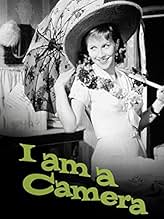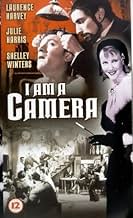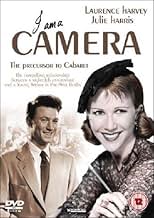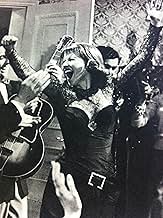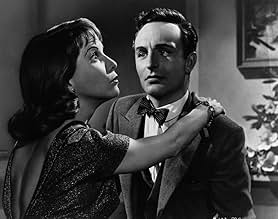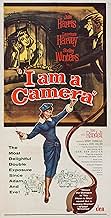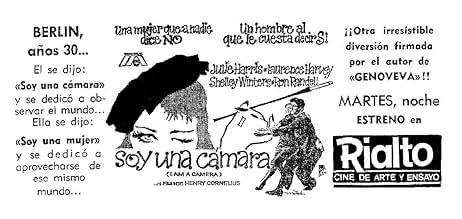In Weimar-era Berlin, an aspiring writer strikes up a friendship with a vivacious, penniless singer.In Weimar-era Berlin, an aspiring writer strikes up a friendship with a vivacious, penniless singer.In Weimar-era Berlin, an aspiring writer strikes up a friendship with a vivacious, penniless singer.
- Director
- Writers
- Stars
- Nominated for 1 BAFTA Award
- 1 nomination total
William Adams
- Old Doctor
- (uncredited)
Ian Ainsley
- Minor Role
- (uncredited)
Charles Andre
- Waiter
- (uncredited)
Julia Arnall
- Model
- (uncredited)
Jack Arrow
- Troika Doorman
- (uncredited)
- Director
- Writers
- All cast & crew
- Production, box office & more at IMDbPro
Featured reviews
Hindsight is a wonderful thing. Much reviled when it first appeared, (inspiring the famous review 'Me No Leica'), this precursor of "Cabaret" can now be looked at in comparison and it's not half bad. It's certainly no classic but it has its own wayward charm, (the film version of "Cabaret" follows this plot whereas the stage version changed the plot somewhat). One should, of course, resist the temptation to snicker when Laurence Harvey's Christopher Isherwood, (it keeps the original author's real name; God Knows what Isherwood thought of it), describes himself as 'a confirmed bachelor' and while Harvey is an utterly inadequate 'hero', (he's virtually asexual), and Shelly Winters woefully miscast as Fraulien Landauer, (the part Marisa Berenson played in "Cabaret"), Julie Harris is a perfectly marvellous Sally, (it's a lovely piece of comic acting), and Anton Diffring is first-rate as Fritz, the German-Jew in love with Shelly's character. Of course, if "Cabaret" had never come along you might ask yourself would this ever have seen the light of day again. That it has been revived may not quite be cause for celebration but it's perfectly acceptable all the same.
I only watched this film because I was determined to spot Patrick McGoohan in an early film role. I watched Laurence Harvey as the aimless, charming character he plays, thinking of his breakthrough role as the surly grasping man at the top. Good old Anton Diffring flashing his gnashers in all their gap-toothed glory. Shelley Winters as an innocent rather than a Vamp. It was all jolly good stuff. I kept wondering where I'd seen the Sally Bowles character before.
My McGoohan moment came and went, he went through a gamut of emotion, exercising his foreign accent in his entrance, quite keen, then looking thoroughly bemused as his part became slapstick, not to say fed up by the last you saw of him. I almost packed the film up at that point, but decided I might as well see the end. It had become a little surreal by then so I was curious to see how they would wrap it up.
In what I would guess would have been the theatrical Third Act, it all became clear. The affable nonsense of the earlier scenes was all thrown into focus by the stark, grim realisation that evil was about to take over the world. The characters each found their own ways to escape or avoid it and I was pleased for all of them. It was in these final scenes that it suddenly dawned on me who Sally Bowles was. She was the timid, tragic victim in one of my favourite ever films: 'The Haunting'. The actress I was always confusing in my mind with Deborah Kerr, as a fragile feminine beauty.
Some readers may now be remarking 'What a dork! It says Julie Harris on the cover!' But I didn't remember this person as Julie Harris. The name meant nothing. I remembered her as poor Eleanor and Eleanor has haunted me for years. I prefer to believe that, rather than me being an unobservant dork, it is a tribute to the talent of Ms Harris that for most of this movie I simply didn't recognise her.
Anyhow, the point is that, but for my compulsion to watch a movie just to see an early bit-part of one favourite, I would never have seen a starring role of another. I find a certain peace in the discovery.
My McGoohan moment came and went, he went through a gamut of emotion, exercising his foreign accent in his entrance, quite keen, then looking thoroughly bemused as his part became slapstick, not to say fed up by the last you saw of him. I almost packed the film up at that point, but decided I might as well see the end. It had become a little surreal by then so I was curious to see how they would wrap it up.
In what I would guess would have been the theatrical Third Act, it all became clear. The affable nonsense of the earlier scenes was all thrown into focus by the stark, grim realisation that evil was about to take over the world. The characters each found their own ways to escape or avoid it and I was pleased for all of them. It was in these final scenes that it suddenly dawned on me who Sally Bowles was. She was the timid, tragic victim in one of my favourite ever films: 'The Haunting'. The actress I was always confusing in my mind with Deborah Kerr, as a fragile feminine beauty.
Some readers may now be remarking 'What a dork! It says Julie Harris on the cover!' But I didn't remember this person as Julie Harris. The name meant nothing. I remembered her as poor Eleanor and Eleanor has haunted me for years. I prefer to believe that, rather than me being an unobservant dork, it is a tribute to the talent of Ms Harris that for most of this movie I simply didn't recognise her.
Anyhow, the point is that, but for my compulsion to watch a movie just to see an early bit-part of one favourite, I would never have seen a starring role of another. I find a certain peace in the discovery.
Lots of history behind this story of Sally Bowles, party-girl in 1930s Berlin who befriends a stolid English gent amidst the Nazi uprising. Curious, rather indifferent drama isn't helped by Julie Harris as Bowles; Harris tries hard, but she's too intelligent a presence to be convincing as a flake and her big moments don't come off. Non-flashy adaptation of both Christopher Isherwood's "Berlin Stories" and John Van Druten's subsequent play, it is sure to interest fans of Bob Fosse's "Cabaret" as a great deal of the dialogue mirrors passages in "Cabaret" almost verbatim. Those who stumble upon it unawares will probably find the movie stilted and dull. It's little more than a footnote now in this chain of literature and cinematic events. ** from ****
In this film Julie Harris reprises her Tony award-winning performance as Sally Bowles bumming in 1920s Berlin. I loved Julie and envied Sally and her carefree ways, but I was young then. While the film may not be "important," it does tell us something about life and culture based upon Christopher Isherwood's evocation of fun-loving pre-Hitler Berlin. It's about a world and time long vanished & highly lamented by aging romantics such as I. So temper your critical faculties and just enjoy a stunning performance by Julie Harris who has won more Tony Awards (5) than any other actress.
With two shining stars such as Julie Harris (the Julie Andrews of the 50s), and Lawrence Harvey, this film was almost guaranteed to be a success. The film is not as graphic as the later, superior production, but it is fun to watch, nevertheless. Even Shelley Winters gives a decent performance for a change (oh no, my harshest critic will be offended!). The Harvey character was supposed to be gay, which the latter production made clear, but during this film period, that issue was pretty much taboo in movies. The film has a Capraesque feel to it, and yet it has a few serious moments as well. I am restricted in my use of the word recommended by my critic, but I am going to use it anyway.
Did you know
- TriviaDespite being far less salacious than the 1951 stage play on which it was based, this film adaptation received a "Condemned" rating from the Legion of Decency, a Roman Catholic organization that passed moral judgments on films between 1933 and 1965. This rating was also given to Psycho (1960), Some Like It Hot (1959) and Breathless (1960).
- GoofsWhilst most of the film is a flashback set in the early 1930s, all the costumes and hairstyles worn are straight out of the early 1950s.
- Quotes
Christopher Isherwood: [to Sally] Any mess you get into, you try and get out of by using your extremely inadequate sex appeal.
- Crazy creditsIn opening credits, Shelley Winters is misspelled "Shelly".
- ConnectionsFeatured in Omnibus: Christopher Isherwood: A Born Foreigner (1969)
- SoundtracksI Saw Him in a Café in Berlin
(uncredited)
Music by Ralph Maria Siegel
English lyrics by Paul Dehn
Sung by Liselotte Malkowsky
[Sally (Julie Harris) sings the song in her club act]
- How long is I Am a Camera?Powered by Alexa
Details
- Release date
- Country of origin
- Languages
- Also known as
- Jag är en kamera
- Production companies
- See more company credits at IMDbPro
- Runtime
- 1h 38m(98 min)
- Color
- Aspect ratio
- 1.37 : 1
Contribute to this page
Suggest an edit or add missing content


